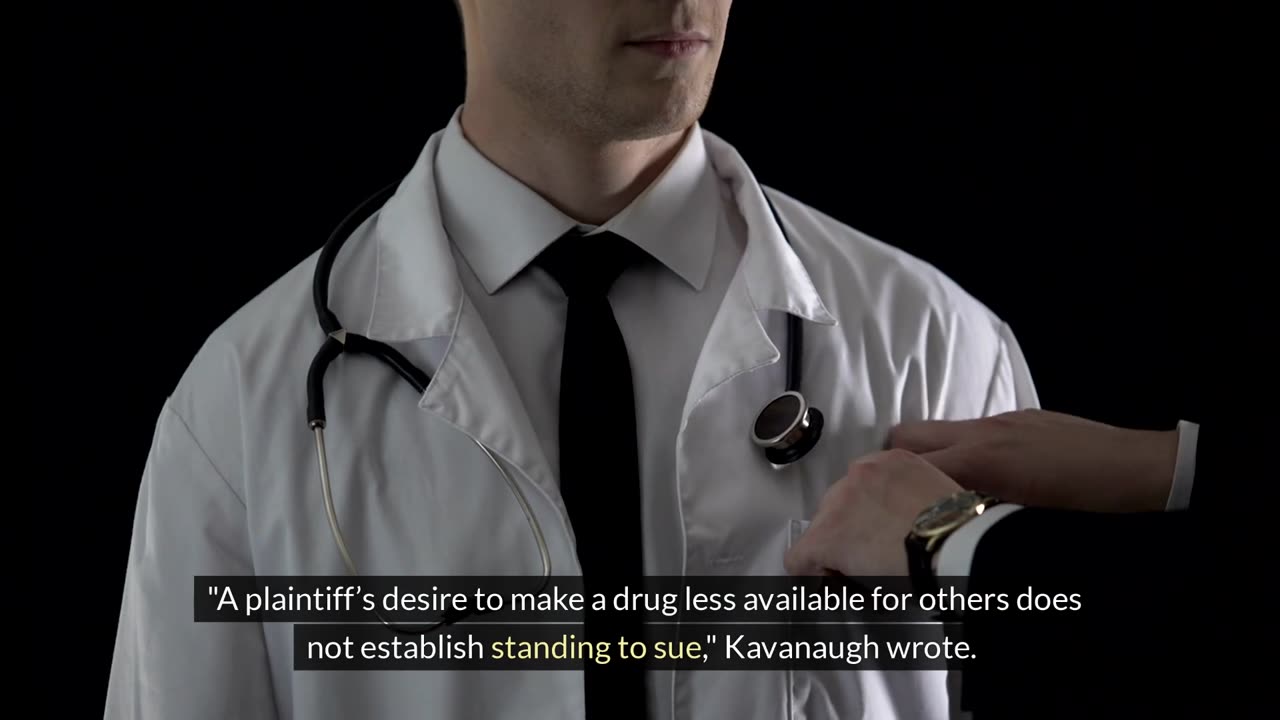Premium Only Content

Supreme Court Upholds Access to Abortion Drug Mifepristone: A Landmark Decision
**Introduction: A Victory in the Ongoing Battle for Reproductive Rights**
In a significant ruling, the U.S. Supreme Court has unanimously rejected an effort to restrict access to the abortion pill mifepristone. This decision, coming two years after the court rescinded the nationwide guarantee to an abortion, has been welcomed by pro-choice activists and marks a crucial moment in the ongoing struggle for reproductive rights in America. However, this ruling also leaves the door open for future legal challenges, highlighting the complexity and volatility of abortion laws in the U.S.
## The Case Against Mifepristone
### The Alliance for Hippocratic Medicine's Challenge
The plaintiffs, known as the Alliance for Hippocratic Medicine, argued that the approval of mifepristone by the U.S. Food and Drug Administration (FDA) should be withdrawn. They contended that the drug posed significant health risks and that its availability should be limited. However, during arguments in March, several justices expressed skepticism that any of the plaintiffs had suffered harm from the availability of mifepristone, a necessary condition for having the legal standing to sue.
### The Supreme Court's Rationale
Justice Brett Kavanaugh, writing for the court, stated that while the plaintiffs had sincere legal, moral, and ideological objections to elective abortion and the FDA's regulation of mifepristone, they failed to demonstrate any actual injury. "A plaintiff’s desire to make a drug less available for others does not establish standing to sue," he wrote. This rationale underscored the court's position that ideological opposition alone is insufficient to restrict access to approved medical treatments.
## The Role of Mifepristone in Medication Abortion
### A Critical Component of Reproductive Healthcare
Mifepristone is one of two drugs used in a medication abortion, the most common method of terminating pregnancies in the U.S. Approved by the FDA in 2000 for use up to 10 weeks of pregnancy, mifepristone is followed by misoprostol to complete the abortion process. The FDA has consistently maintained that both drugs are safe and effective, with medication abortion being about 95% effective in ending pregnancy and requiring further medical follow-up less than 1% of the time.
### Increased Accessibility and Its Impact
Since 2016, the FDA has eased access to mifepristone, allowing doctors to hold virtual appointments and for prescriptions to be sent by mail. These changes have made it easier for individuals, especially those in restrictive states, to access abortion care. The ruling by the Supreme Court ensures that these avenues remain open, at least for the time being.
## The Broader Implications of the Ruling
### A Qualified Victory for Pro-Choice Advocates
Pro-choice activists have hailed the Supreme Court's decision as a victory, but caution that it is a qualified one. While access to mifepristone is preserved, the ruling does not impact state laws that ban or severely restrict abortion. Medication abortion remains illegal in states with such bans, and the legal landscape continues to be fraught with challenges.
### Future Legal Battles on the Horizon
The Supreme Court's decision does not preclude future attempts to challenge the FDA's approval of mifepristone. At least three states—Missouri, Kansas, and Idaho—have opposed the FDA's approval of the drug in court. This ruling leaves the door open for these and other potential legal challenges, indicating that the fight over abortion pills is far from over.
## The Political and Social Context
### Abortion as a Political Flashpoint
Since the overturning of Roe v. Wade in June 2022, abortion has become a central issue in American politics. Twenty-one states have moved to restrict abortion earlier in pregnancy than the standard set by Roe, with seventeen barring the procedure at six weeks or earlier. These restrictions have sparked significant political and social debates, making abortion a key issue in upcoming elections.
### The Stance of Political Leaders
Former President Donald Trump, the presumptive Republican presidential nominee, has called for compromise within his party on abortion laws, suggesting that strict bans could be politically costly. His comments reflect a broader tension within the Republican Party, caught between a base that opposes abortion and a general electorate that broadly supports access to the procedure.
## The Ongoing Struggle for Reproductive Rights
### The Importance of Continued Advocacy
Pro-choice activists emphasize that the fight for reproductive freedom is ongoing. Nancy Northup, president of the Center for Reproductive Rights, stated that the Supreme Court's ruling is not a definitive win for abortion rights but rather a maintenance of the status quo. She highlighted the need for continued vigilance and advocacy to protect and expand access to abortion care.
### The Role of Public Awareness
Raising public awareness about the safety and necessity of medication abortion is crucial. Studies have consistently shown that mifepristone and misoprostol are safe for use, and educating the public about these facts can help counter misinformation and stigma surrounding abortion.
**Conclusion: A Call to Action**
The Supreme Court's decision to uphold access to mifepristone is a critical moment in the ongoing battle for reproductive rights. However, the fight is far from over. Future legal challenges and political battles loom on the horizon, underscoring the need for continued advocacy and public awareness.
Thank you for reading! If you found this article informative, please like, comment, share, and subscribe to our channel for more updates on reproductive rights and other important health topics. Your support helps us continue to provide valuable information and foster meaningful discussions.
-
 25:53
25:53
Stephen Gardner
8 hours ago🔥BREAKING: Trump HATING LAWYER busted in $17 million money laundering scheme!
35.2K101 -
 20:10
20:10
CartierFamily
15 hours agoAndrew Schulz DESTROYS Charlamagne’s WOKE Meltdown on DOGE & Elon Musk!
116K97 -
 33:56
33:56
The Why Files
9 days agoLegend of the 13 Crystal Skulls | From Mars to the Maya
71.2K39 -
 2:56:14
2:56:14
TimcastIRL
8 hours agoEPSTEIN Files DROP, FBI GOES ROGUE, AG Says They COVERED UP Epstein Case w/Amber Duke | Timcast IRL
190K104 -
 1:39:23
1:39:23
Kim Iversen
9 hours ago"Canada's Trump" Is Trudeau’s Worst Nightmare: Is Maxime Bernier the Future of Canada?
81.1K84 -
 DVR
DVR
Bannons War Room
10 days agoWarRoom Live
2.67M446 -
 16:06
16:06
The Rubin Report
15 hours agoProof the Islamist Threat in England Can No Longer Be Ignored | Winston Marshall
96.3K84 -
 2:07:07
2:07:07
Robert Gouveia
12 hours agoFBI Files Coverup! Bondi FURIOUS; SCOTUS Stops Judge; Special Counsel; FBI Does
122K89 -
 56:15
56:15
Candace Show Podcast
13 hours agoBREAKING: My FIRST Prison Phone Call With Harvey Weinstein | Candace Ep 153
177K116 -
 1:56:39
1:56:39
Flyover Conservatives
11 hours agoROBIN D. BULLOCK | Prophetic Warning: 2030 Is Up for Grabs – If We Don’t Act Now, Disaster Awaits! | FOC SHOW
63.7K13